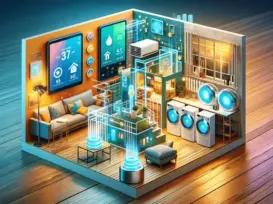Grus Home Energy - Heat pump energy efficiency
Maximizing Comfort and Savings: The Energy Efficiency of Modern Heat Pumps
Maximizing Comfort and Savings: The Energy Efficiency of Modern Heat Pumps
When it comes to heating and cooling homes, energy efficiency is a top concern for homeowners looking to reduce their carbon footprint and save on utility bills. Heat pumps have surged in popularity as an environmentally friendly and cost-effective solution. A heat pump works by transferring heat from one place to another using a small amount of energy. In the winter, it extracts heat from the outside air or ground to warm the interior of a house, and in the summer, it reverses the process, acting much like an air conditioner to cool the interior.
Heat pump technology has come a long way, and modern heat pumps are far more efficient than their predecessors. They are capable of delivering one-and-a-half to three times more heat energy to a home than the electrical energy they consume. This is measured by the Coefficient of Performance (COP), which compares the amount of heat produced to the amount of electricity used. A higher COP indicates a more efficient system. Today’s high-efficiency heat pumps can have COPs ranging from 3 to 5, which means they are 300% to 500% efficient, dramatically cutting energy use and costs when compared to traditional heating systems.
The efficiency of heat pumps is not constant and can be affected by several factors, including the outdoor temperature, the quality of installation, and the condition of the ductwork. Air-source heat pumps, for example, are most efficient in moderate climates, but may require a supplemental heating source in extreme cold. Ground-source or geothermal heat pumps, on the other hand, are more stable as they draw heat from the ground, which remains at a more constant temperature year-round.
To maximize the energy efficiency of heat pumps, it’s important to ensure that they are properly sized and installed. An oversized or undersized unit will not operate efficiently and can lead to increased wear and tear. Proper installation involves not just the heat pump itself, but also making sure that the ductwork is well-sealed and insulated, and that the home is as airtight and well-insulated as possible to retain the conditioned air.
Another factor that can influence the energy efficiency of heat pumps is the use of advanced features such as variable speed compressors and fans. These allow the heat pump to adjust its output to match the heating or cooling demand more precisely, reducing energy consumption and providing more consistent indoor comfort. Some models also come equipped with smart controls that can optimize performance based on usage patterns and even provide remote access for monitoring and adjustments.
Incentives and rebates are often available to homeowners who choose to install energy-efficient heat pumps, further offsetting the initial investment. Moreover, with the increasing focus on renewable energy, some heat pumps can be integrated with solar panel systems, providing an even more sustainable and cost-effective solution for home heating and cooling.
In conclusion, modern heat pumps represent a significant step forward in energy efficiency for residential heating and cooling. By choosing the right type of heat pump, ensuring proper sizing and installation, and taking advantage of advanced features, homeowners can enjoy a comfortable living environment while drastically reducing their energy consumption and contributing to a more sustainable future.
Blog, Smart Home Automation , February 17, 2024 , Eco-friendly home temperature control, Energy-saving home upgrades, Heat pump energy efficiency, Heat pump optimization, Reducing energy bills with smart thermostats, Remote heat pump control, Smart HVAC technology, Smart thermostat for heat pump, Smart Thermostats
©2025 All Rights Reserved. Grus IoT Co.,Ltd.
